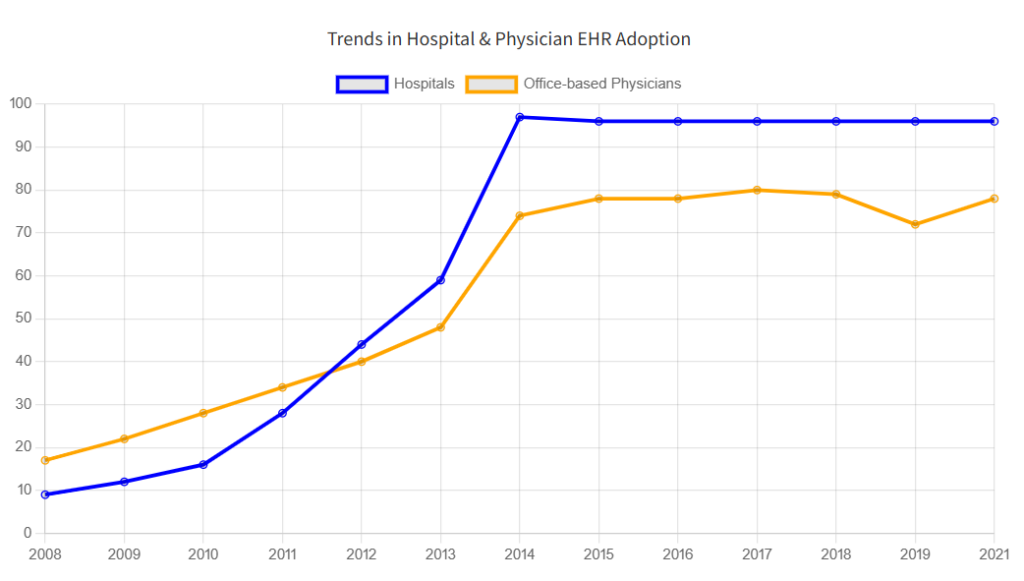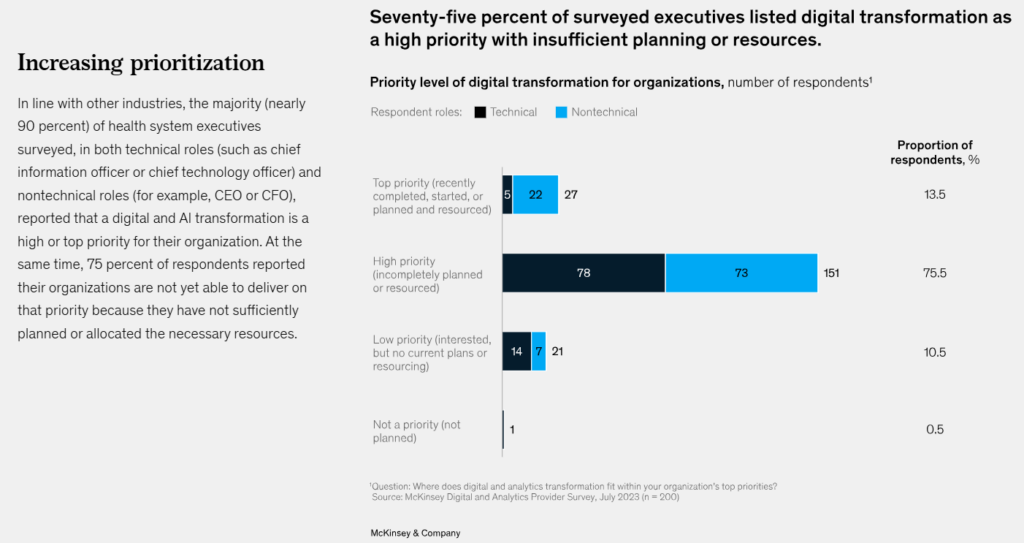Healthcare Digital Transformation Consulting: Strategies & Insights
The healthcare industry is undergoing a significant transformation as it embraces digital technologies to improve patient outcomes, streamline operations, and reduce costs. Healthcare digital transformation consulting is a crucial service for organizations seeking to navigate this evolving landscape. This blog explores key strategies, insights, and trends in healthcare digital transformation consulting, providing a comprehensive guide for healthcare providers looking to leverage the power of technology.

Understanding Healthcare Digital Transformation Consulting
Healthcare digital transformation consulting involves the process of guiding healthcare organizations through the integration of digital technologies into their operations, workflows, and service offerings. Consultants in this field help healthcare providers adopt technologies like Electronic Health Records (EHRs), telemedicine, Artificial Intelligence (AI), data analytics, and patient engagement tools to improve care delivery and operational efficiency.
Healthcare digital transformation consulting focuses not just on technology adoption, but also on aligning digital solutions with the organization’s strategic goals. The aim is to enhance patient care, optimize operational processes, ensure regulatory compliance, and ultimately drive positive health outcomes. A well-executed digital transformation in healthcare can lead to improved patient experiences, reduced medical errors, and enhanced decision-making.
Key Strategies in Healthcare Digital Transformation
As the healthcare industry undergoes a significant digital shift, implementing the right strategies is crucial for organizations looking to stay competitive and improve patient care. Healthcare digital transformation involves more than just adopting new technologies; it requires a comprehensive approach to integrate these innovations into every aspect of healthcare operations. Key strategies in healthcare digital transformation not only streamline internal processes but also enhance patient experiences and outcomes.
Implementing Electronic Health Records (EHRs) and Health Information Systems
A key area of digital transformation in healthcare is the shift from paper-based to digital records. EHR systems are central to healthcare digital transformation, enabling seamless sharing of patient data among healthcare professionals, improving communication, and reducing errors. According to a report by HealthIT.gov, 96% of U.S. hospitals had adopted EHR systems by 2021, marking a significant shift towards digitalization in healthcare. Healthcare digital transformation consulting plays a vital role in helping organizations select, implement, and optimize EHR solutions that align with their needs.

Image source: HealthIT.gov
Telemedicine and Remote Care Solutions
In 2023, the global telemedicine market size was valued at USD 97.15 billion and is expected to expand at a CAGR of 19% from 2024 to 2032, according to Fortune Business Insight. Telemedicine has emerged as a cornerstone of healthcare digital transformation. Especially post-pandemic, healthcare providers are increasingly relying on telemedicine platforms to deliver virtual care. Healthcare digital transformation consulting helps organizations implement and scale telemedicine solutions that meet regulatory requirements, ensure patient privacy, and enhance access to care.

Image source: Fortune Business Insight
Data Analytics for Enhanced Decision-Making
With the wealth of data generated in the healthcare ecosystem, data analytics is essential for making informed decisions. Healthcare digital transformation consultants help organizations implement data analytics platforms that can extract actionable insights from large datasets. These insights can be used for predictive analytics, improving patient outcomes, and optimizing resource allocation.
AI and Machine Learning in Healthcare
Artificial Intelligence (AI) and machine learning are driving innovation in healthcare by enabling more accurate diagnostics, personalized treatment plans, and automated administrative tasks. Healthcare digital transformation consulting can assist organizations in identifying use cases where AI and machine learning can be applied, whether for predictive analytics, virtual assistants, or clinical decision support systems.
Patient Engagement Tools
Patient engagement is another critical aspect of healthcare digital transformation. With the rise of mobile apps, portals, and wearables, healthcare providers are able to engage patients in their care in more meaningful ways. Consultants help organizations implement patient engagement tools that improve communication, adherence to treatment plans, and overall patient satisfaction.
Cybersecurity in Healthcare
According to HIPAA Journal, in 2023, over 133 million healthcare records were breached, highlighting the critical need for robust cybersecurity in healthcare. Medical data breaches are also various of types.
Image source: FreeAgent CRM Resources
As healthcare organizations digitize their operations, protecting sensitive patient data becomes paramount. Healthcare digital transformation consultants help organizations strengthen their cybersecurity posture to prevent data breaches, ransomware attacks, and other security threats. This includes implementing secure infrastructure, multi-factor authentication, and encryption technologies.
Interoperability and Integration
One of the main challenges in healthcare digital transformation is ensuring that systems can communicate with each other. Healthcare organizations often use multiple systems to manage different aspects of care, such as EHRs, lab systems, and imaging systems. Healthcare digital transformation consultants help integrate these systems to enable interoperability, ensuring that data flows smoothly between different platforms and departments.
A software development company plays a critical role in healthcare digital transformation. These companies create custom software solutions tailored to the unique needs of healthcare organizations, helping them optimize their workflows, enhance patient care, and streamline operations. Healthcare providers often partner with a software development company to develop and implement solutions such as EHR systems, telemedicine platforms, patient portals, and mobile apps. In addition to offering custom solutions, software development companies provide ongoing support and updates to ensure that healthcare digital transformation remains aligned with evolving regulations, technological advancements, and organizational goals. As one of the leading healthcare app development companies, Savvycom specializes in creating customized Healthcare IT solutions that streamline operations, enhance patient care, and drive innovation.
Have a Project Idea in Mind?
Get in touch with Savvycom’s experts for a free consultation. We’ll help you decide on next steps, explain how the development process is organized, and provide you with a free project estimate.
Trends Shaping Healthcare Digital Transformation
As digital technologies continue to evolve, healthcare organizations are increasingly adopting innovative solutions that reshape how care is delivered and managed. These trends not only improve operational efficiency but also enhance patient outcomes and experience. Let’s explore some of the most significant trends currently shaping the healthcare digital transformation landscape.
Cloud Computing in Healthcare
Cloud computing has become an essential component of healthcare digital transformation, offering healthcare providers a flexible and scalable solution to manage vast amounts of data. By moving data storage and processing to the cloud, healthcare organizations can eliminate the need for costly on-premise infrastructure, significantly reducing overhead costs. Cloud-based systems allow healthcare professionals to securely store, access, and share patient data across locations, enabling seamless collaboration between hospitals, clinics, and specialists, regardless of geography.
Additionally, cloud computing offers healthcare organizations the flexibility to scale resources as needed, improving operational agility. The secure storage of sensitive patient data in the cloud also supports compliance with regulatory frameworks like HIPAA, ensuring data privacy and protection. Healthcare providers can also benefit from enhanced disaster recovery capabilities, as cloud-based systems provide backup and data recovery options to safeguard against system failures or cyber threats.
Blockchain Technology in Healthcare
Blockchain technology is emerging as a powerful tool to address some of the most pressing issues in healthcare, particularly around data security, transparency, and fraud prevention. Blockchain’s decentralized nature ensures that data is securely stored across multiple nodes, making it nearly impossible for malicious actors to alter or manipulate patient records. This enhances the integrity and accuracy of health data, which is crucial for providing quality care.
Beyond data security, blockchain facilitates seamless and transparent sharing of health information across different stakeholders, including hospitals, insurers, and patients. With blockchain, healthcare organizations can enable more secure and efficient data exchanges, such as transferring patient records or claims processing. Additionally, blockchain technology can reduce fraud by ensuring that the transactions and interactions within the healthcare ecosystem are recorded immutably, reducing the risk of identity theft and billing fraud.
Wearable Devices and IoT in Healthcare
Wearable devices and the Internet of Things (IoT) are transforming patient monitoring and chronic disease management by enabling continuous, real-time tracking of health metrics. Wearable devices like smartwatches, fitness trackers, and biosensors can monitor vital signs such as heart rate, blood pressure, and glucose levels, providing healthcare providers with valuable data to assess patient health status.
The integration of IoT-enabled devices in healthcare allows for more personalized and proactive care, enabling real-time interventions when health metrics indicate potential issues. For example, continuous glucose monitors (CGMs) for diabetic patients can alert both the patient and the healthcare provider when blood sugar levels are outside the safe range, prompting immediate action. Similarly, remote patient monitoring devices for chronic conditions like heart disease allow doctors to track patient progress without the need for frequent office visits, improving efficiency and patient satisfaction.
These technologies are especially valuable for managing long-term conditions and providing post-operative care, as they empower patients to take an active role in managing their health while providing healthcare providers with data-driven insights to enhance treatment plans.
How Healthcare Digital Transformation Consulting Can Help
Healthcare organizations looking to implement digital transformation solutions can greatly benefit from healthcare digital transformation consulting. In fact, a 2023 McKinsey & Company Survey revealed that 90% of healthcare executives consider digital transformation to be a top priority for their organizations. Healthcare digital transformation consulting helps organizations navigate the complex landscape of digital tools, ensuring that they choose the right strategies and solutions for their unique needs.

Image source: McKinsey & Company
Consultants in this field assess an organization’s current technological landscape, identify gaps in processes and systems, and create a roadmap for successful transformation. Their expertise ensures that digital solutions are not only implemented effectively but also aligned with the organization’s overall strategic goals. Below are some key ways in which healthcare digital transformation consulting adds value:
-
Technology Assessment: Consultants evaluate existing systems to identify areas for improvement. This assessment helps organizations determine the most appropriate digital solutions to enhance their workflows and patient care.
-
Strategic Planning: Developing a long-term strategy is essential for integrating digital technologies effectively. Consultants work closely with healthcare providers to create a comprehensive plan that aligns with business objectives and regulatory requirements.
-
Vendor Selection: With a myriad of technology vendors and solutions available, selecting the right partners can be overwhelming. Healthcare digital transformation consultants help organizations navigate this process, ensuring they choose vendors who offer the best-fit solutions for their needs.
-
Change Management: Implementing new digital solutions requires significant changes to workflows and processes. Consultants assist healthcare providers with change management by training employees, fostering a culture of innovation, and ensuring that new technologies are adopted seamlessly across the organization.
-
Compliance and Risk Management: With the increasing amount of sensitive data being stored and exchanged digitally, compliance with healthcare regulations like HIPAA is critical. Consultants help healthcare organizations manage data security risks and ensure that their digital solutions comply with industry standards and regulations.
By working with healthcare digital transformation consultants, organizations can ensure a smooth transition into the digital age, optimize operations, and improve patient care outcomes.
Conclusion
Healthcare digital transformation consulting is an essential service for healthcare providers looking to leverage digital technologies to improve patient outcomes, optimize operations, and stay competitive in the evolving healthcare landscape. By embracing technologies such as EHRs, AI, telemedicine, and data analytics, healthcare organizations can achieve greater efficiency and deliver better care.
Collaborating with experienced consultants and a trusted software development company like Savvycom can ensure a successful digital transformation journey. We offers end-to-end solutions, from developing healthcare mobile app development to integrating custom healthcare software and implementing telemedicine platforms. By collaborating with healthcare providers, Savvycom ensures that they can optimize their digital transformation strategy, offering the best-in-class healthcare solution tailored to their unique needs.
Additionally, Savvycom’s expertise in outsourcing in healthcare allows organizations to leverage cost-effective, high-quality development services. Whether it’s implementing an EHR system, building patient engagement platforms, or creating innovative healthcare app ideas, Savvycom’s team is equipped to turn digital visions into reality.
As the healthcare industry continues to evolve, the right strategies, tools, and partnerships will be key to navigating the challenges and unlocking the full potential of digital transformation.
Tech Consulting, End-to-End Product Development, Cloud & DevOps Service! Since 2009, Savvycom has been harnessing digital technologies for the benefit of businesses, mid and large enterprises, and startups across the variety of industries. We can help you to build high-quality software solutions and products as well as deliver a wide range of related professional services.
Savvycom is right where you need. Contact us now for further consultation:
- Phone: +84 24 3202 9222
- Hotline: +1 408 663 8600 (US); +612 8006 1349 (AUS); +84 32 675 2886 (VN)
- Email: [email protected]


